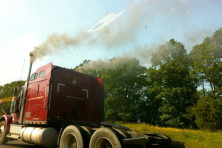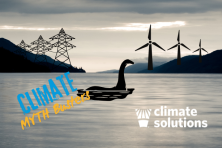Oregon is at a critical crossroads when it comes to clean transportation. Recently, diesel truck manufacturers and fossil fuel companies have led efforts to slow Oregon's progress toward reducing diesel pollution by delaying the implementation of our state's Advanced Clean Trucks rule. Here's why we need to fight those efforts and why we need to accelerate, not slow down, our transition to clean, pollution-free trucking as an essential step toward reducing diesel pollution and advancing clean transportation technology.
A Dangerous Precedent: Weakening Our State Environmental and Air Quality Protection Agency:
Attempts to delay the ACT rule through legislative tinkering set a concerning precedent by undermining agency expertise and interfering with the established process of agency rulemaking. The Oregon Department of Environmental Quality (DEQ) is actively working with truck manufacturers to add additional flexibility for compliance. Unfortunately, some diesel truck manufacturers are using this process to spread disinformation. Governor Tina Kotek has publicly supported DEQ’s approach, emphasizing the importance of maintaining the integrity of the ACT rule while finding workable solutions for the industry.
Any attempt to legislatively derail the ACT rule not only undermines DEQ’s expertise and authority but also threatens Oregon’s leadership on clean air policies. Numerous climate, environmental justice, and public health organizations have come together to oppose this delay, recognizing the danger it poses to progress made in cleaner transportation.
Oregon ← A State Under National Attack
Why are we even talking about rolling back progress instead of leaning into solutions? Multi-billion dollar trucking, oil, and other industries oppose clean air and climate protections and have specifically targeted Oregon and a handful of other states to start a domino chain of deregulation. They hope that if Oregon weakens its commitment to clean trucks, it will trigger similar rollbacks in the 11 other states adopting similar standards. This delay would erase years of hard-earned progress toward reducing harmful diesel pollution and promoting cleaner truck technologies. As the current federal government makes attack after attack on climate protection policies like clean trucks, these 11 states can and must continue to support this growing industry.
Given recent federal rollbacks that threaten climate and environmental progress, Oregon must hold strong—not retreat in the face of pressure.
Learning from Past Mistakes
Historically, when Oregon has failed to keep pace with California’s stronger clean vehicle standards, manufacturers have taken advantage by sending older, dirtier vehicles into Oregon. This effectively made our state a dumping ground for high-pollution diesel trucks. With neighboring states like Washington and California moving forward with their own ACT rules, Oregon risks repeating past mistakes and becoming a pollution magnet if we delay implementation.
Efforts to delay the ACT rule until 2027 isn’t just a brief pause—it’s a strategy that could permanently throw Oregon’s clean truck program out of gear altogether, with lasting consequences for our air quality, our health, and our climate.
Department of Environmental Quality is Addressing Industry Concerns
Oregon’s Department of Environmental Quality is working diligently to refine the details of implementing new clean trucking standards, ensuring a balanced approach that will accommodate industry needs without compromising the overall program. Governor Kotek recently reaffirmed Oregon’s commitment to environmental progress and sensible industry accommodations. DEQ’s robust rulemaking process is the best way to address these complex issues and should be allowed to continue without unnecessary interference.
Our take on DEQ’s proposal? The draft rules are extremely generous to manufacturers, providing significant added flexibility for them to comply with the program. Even so, by upholding the integrity of the ACT, the proposed rules represent a far better solution than delaying the program entirely.
Bottom Line
Oregon must stay committed to clean transportation and clean air standards. Delaying or weakening the ACT rule would be a serious setback, invite dirtier trucks onto our roads, and embolden national efforts to roll back crucial environmental protections. We are thrilled that leaders in the Oregon legislature rightfully recognized the importance of upholding these vital protections by preventing harmful ACT delay legislation from moving forward in committee. As the session progresses, it’s critical that the Legislature continue to reject these efforts, including in a 2025 transportation package. This will allow DEQ to continue effectively manage the ACT program, safeguarding our air quality, public health, and climate future.





